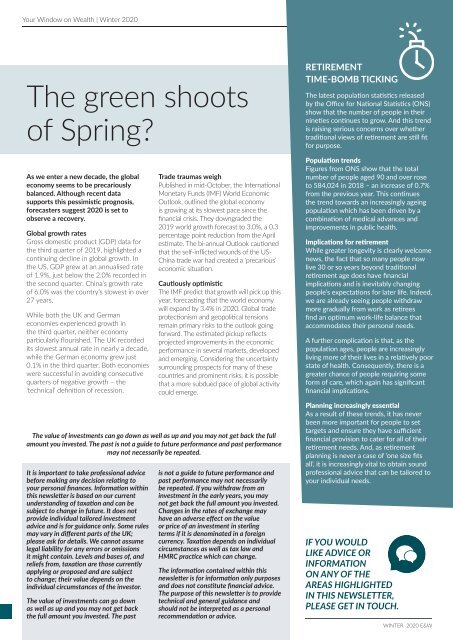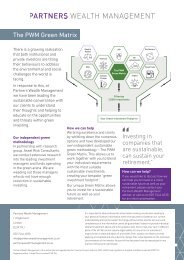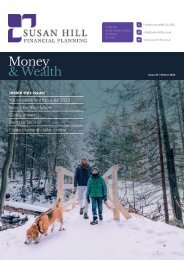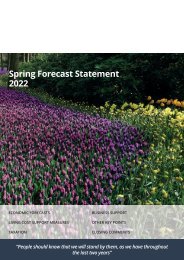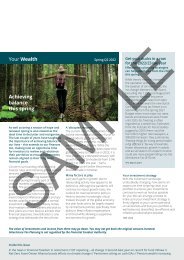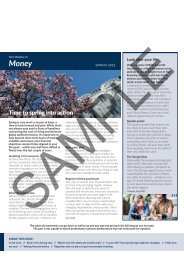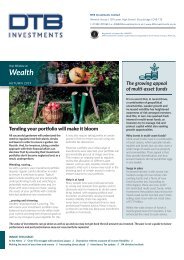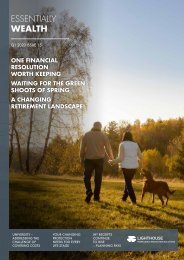59_D_D_DTB Investments Ltd_Winter Newsletter 2019_100
Create successful ePaper yourself
Turn your PDF publications into a flip-book with our unique Google optimized e-Paper software.
Your Window on Wealth | <strong>Winter</strong> 2020<br />
The green shoots<br />
of Spring?<br />
As we enter a new decade, the global<br />
economy seems to be precariously<br />
balanced. Although recent data<br />
supports this pessimistic prognosis,<br />
forecasters suggest 2020 is set to<br />
observe a recovery.<br />
Global growth rates<br />
Gross domestic product (GDP) data for<br />
the third quarter of <strong>2019</strong>, highlighted a<br />
continuing decline in global growth. In<br />
the US, GDP grew at an annualised rate<br />
of 1.9%, just below the 2.0% recorded in<br />
the second quarter. China’s growth rate<br />
of 6.0% was the country’s slowest in over<br />
27 years.<br />
While both the UK and German<br />
economies experienced growth in<br />
the third quarter, neither economy<br />
particularly flourished. The UK recorded<br />
its slowest annual rate in nearly a decade,<br />
while the German economy grew just<br />
0.1% in the third quarter. Both economies<br />
were successful in avoiding consecutive<br />
quarters of negative growth – the<br />
‘technical’ definition of recession.<br />
It is important to take professional advice<br />
before making any decision relating to<br />
your personal finances. Information within<br />
this newsletter is based on our current<br />
understanding of taxation and can be<br />
subject to change in future. It does not<br />
provide individual tailored investment<br />
advice and is for guidance only. Some rules<br />
may vary in different parts of the UK;<br />
please ask for details. We cannot assume<br />
legal liability for any errors or omissions<br />
it might contain. Levels and bases of, and<br />
reliefs from, taxation are those currently<br />
applying or proposed and are subject<br />
to change; their value depends on the<br />
individual circumstances of the investor.<br />
The value of investments can go down<br />
4<br />
as well as up and you may not get back<br />
the full amount you invested. The past<br />
Trade traumas weigh<br />
Published in mid-October, the International<br />
Monetary Funds (IMF) World Economic<br />
Outlook, outlined the global economy<br />
is growing at its slowest pace since the<br />
financial crisis. They downgraded the<br />
<strong>2019</strong> world growth forecast to 3.0%, a 0.3<br />
percentage point reduction from the April<br />
estimate. The bi-annual Outlook cautioned<br />
that the self-inflicted wounds of the US-<br />
China trade war had created a ‘precarious’<br />
economic situation.<br />
Cautiously optimistic<br />
The IMF predict that growth will pick up this<br />
year, forecasting that the world economy<br />
will expand by 3.4% in 2020. Global trade<br />
protectionism and geopolitical tensions<br />
remain primary risks to the outlook going<br />
forward. The estimated pickup reflects<br />
projected improvements in the economic<br />
performance in several markets, developed<br />
and emerging. Considering the uncertainty<br />
surrounding prospects for many of these<br />
countries and prominent risks, it is possible<br />
that a more subdued pace of global activity<br />
could emerge.<br />
The value of investments can go down as well as up and you may not get back the full<br />
amount you invested. The past is not a guide to future performance and past performance<br />
may not necessarily be repeated.<br />
is not a guide to future performance and<br />
past performance may not necessarily<br />
be repeated. If you withdraw from an<br />
investment in the early years, you may<br />
not get back the full amount you invested.<br />
Changes in the rates of exchange may<br />
have an adverse effect on the value<br />
or price of an investment in sterling<br />
terms if it is denominated in a foreign<br />
currency. Taxation depends on individual<br />
circumstances as well as tax law and<br />
HMRC practice which can change.<br />
The information contained within this<br />
newsletter is for information only purposes<br />
and does not constitute financial advice.<br />
The purpose of this newsletter is to provide<br />
technical and general guidance and<br />
should not be interpreted as a personal<br />
recommendation or advice.<br />
RETIREMENT<br />
TIME-BOMB TICKING<br />
The latest population statistics released<br />
by the Office for National Statistics (ONS)<br />
show that the number of people in their<br />
nineties continues to grow. And this trend<br />
is raising serious concerns over whether<br />
traditional views of retirement are still fit<br />
for purpose.<br />
Population trends<br />
Figures from ONS show that the total<br />
number of people aged 90 and over rose<br />
to 584,024 in 2018 – an increase of 0.7%<br />
from the previous year. This continues<br />
the trend towards an increasingly ageing<br />
population which has been driven by a<br />
combination of medical advances and<br />
improvements in public health.<br />
Implications for retirement<br />
While greater longevity is clearly welcome<br />
news, the fact that so many people now<br />
live 30 or so years beyond traditional<br />
retirement age does have financial<br />
implications and is inevitably changing<br />
people’s expectations for later life. Indeed,<br />
we are already seeing people withdraw<br />
more gradually from work as retirees<br />
find an optimum work-life balance that<br />
accommodates their personal needs.<br />
A further complication is that, as the<br />
population ages, people are increasingly<br />
living more of their lives in a relatively poor<br />
state of health. Consequently, there is a<br />
greater chance of people requiring some<br />
form of care, which again has significant<br />
financial implications.<br />
Planning increasingly essential<br />
As a result of these trends, it has never<br />
been more important for people to set<br />
targets and ensure they have sufficient<br />
financial provision to cater for all of their<br />
retirement needs. And, as retirement<br />
planning is never a case of ‘one size fits<br />
all’, it is increasingly vital to obtain sound<br />
professional advice that can be tailored to<br />
your individual needs.<br />
IF YOU WOULD<br />
LIKE ADVICE OR<br />
INFORMATION<br />
ON ANY OF THE<br />
AREAS HIGHLIGHTED<br />
IN THIS NEWSLETTER,<br />
PLEASE GET IN TOUCH.<br />
WINTER 2020 E&W


